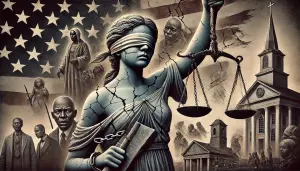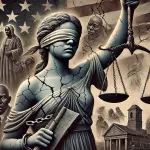 The United States of America, a nation heralded as a beacon of freedom and democracy, has a complex and often troubling history. This history is marked by the national birth defect of slavery, the government-sanctioned genocide of Native Americans, patriarchal and misogynistic attitudes toward women, the enduring legacy of Jim Crow laws, and the divisive political climate exemplified by figures such as Donald Trump. These issues reveal not only deep-seated societal problems but also the profound failures of both the church and government as agents of meaningful change. I have concluded that until the church and the government address these issues, there can be no healing for America.
The United States of America, a nation heralded as a beacon of freedom and democracy, has a complex and often troubling history. This history is marked by the national birth defect of slavery, the government-sanctioned genocide of Native Americans, patriarchal and misogynistic attitudes toward women, the enduring legacy of Jim Crow laws, and the divisive political climate exemplified by figures such as Donald Trump. These issues reveal not only deep-seated societal problems but also the profound failures of both the church and government as agents of meaningful change. I have concluded that until the church and the government address these issues, there can be no healing for America.
The Birth Defect of Slavery
Slavery is often referred to as America’s “original sin,” or as former Secretary of State, Condoleezza Rice called it, “America’s birth defect.” The institution of slavery was deeply embedded in the fabric of early American society, with its ramifications extending far beyond the Civil War and the Emancipation Proclamation. The church and government both played significant roles in the perpetuation of slavery.
Many Christian institutions were complicit in justifying slavery, using theological arguments to endorse or excuse the practice. While some denominations and leaders opposed slavery, their voices were frequently drowned out by those who defended the status quo. This failure to unequivocally denounce slavery allowed the system to persist, causing immense suffering and establishing a legacy of racial injustice that continues to affect American society.
Similarly, the U.S. government’s role in sustaining slavery was equally significant. Legislation such as the Fugitive Slave Act and the Dred Scott Decision upheld and reinforced the institution. Even after the Civil War, the Reconstruction Era’s failure to secure lasting reforms and protections for freed slaves left many African Americans vulnerable to economic exploitation and social disenfranchisement. The government’s inadequate response to these issues contributed to the long-lasting impacts of slavery.
The Government-Sanctioned Genocide of Native Americans
The genocide of Native Americans is another glaring example of the failures of both church and government. The systemic displacement, cultural erasure, and violence inflicted upon indigenous populations were carried out by our government and rationalized through ideologies of racial superiority and manifest destiny.
Most Christian groups either supported or failed to challenge the colonization and forced assimilation of Native Americans. Missionary efforts often involved attempts to erase indigenous cultures and replace them with Eurocentric values and practices. This lack of genuine advocacy for Native American rights and dignity allowed the continued exploitation and marginalization of these communities.
Likewise, the U.S. government enacted policies that facilitated the displacement and mistreatment of Native Americans, such as the Indian Removal Act and the establishment of reservations under often brutal conditions. These policies were justified through a combination of paternalism and economic interests, leading to profound loss and suffering for Native American tribes. The government’s actions and subsequent failures to uphold treaties or support indigenous rights have left enduring scars.
Patriarchal and Misogynistic Attitudes Toward Women
Patriarchy and misogyny have long been embedded in American society, with significant implications for women’s rights and gender equality. Both the church and government have played roles in perpetuating these attitudes.
Most religious teachings, Christianity in particular, have historically reinforced patriarchal norms, limiting women’s roles within the church and broader society. This has contributed to a culture that has marginalized women and restricted their opportunities. The church’s reluctance to fully embrace gender equality has hindered progress toward achieving true parity and justice for women.
For a country ostensibly founded on the ideal of equality, the government abjectly failed to enact and enforce laws promoting gender equality thus allowing patriarchal attitudes to persist. For decades, women fought for basic rights such as the right to vote, equal pay, and protection from violence. While progress has been made, legal and institutional barriers remain that continue to disadvantage women. Governmental inaction or inadequate responses to gender inequality have perpetuated systemic discrimination.
The Legacy of Jim Crow
The legacy of Jim Crow laws represents a period of intense racial segregation and discrimination that continued well into the 20th century. The impact of these laws and the subsequent failure to address their effects remain deeply felt today.
During the Jim Crow era, many Christians and churches either supported segregation or remained silent in the face of racial injustice. While some religious leaders and congregations did stand against Jim Crow laws, their efforts were often undermined by broader institutional resistance. The church’s failure to take a unified, principled stand allowed racial injustice to persist and delayed meaningful reform.
The government’s role in perpetuating segregation through Jim Crow laws and the failure to address the systemic racism underlying these laws were critical. Despite the efforts of civil rights activists, legislative and judicial branches often failed to dismantle discriminatory practices effectively. The reluctance to enforce civil rights protections and to address the socio-economic disparities created by Jim Crow laws has left a lasting impact on American society.
The Advent of Donald Trump
The rise of Donald Trump represents a culmination of deep-seated divisions and dissatisfaction within American society. His presidency has been marked by rhetoric and policies that many view as polarizing and regressive.
The evangelical Christians’ organizational response to Trump has been markedly divided, with some religious leaders endorsing his policies and rhetoric while others have criticized them. This division reflects a broader failure to provide a cohesive moral voice in American politics. The lack of unified ethical guidance has contributed to political polarization and has hindered efforts to address underlying social issues.
Trump’s presidency highlighted significant issues within the government, including perceived partisan polarization and the erosion of democratic norms. The inability of political institutions to address these challenges effectively has exacerbated societal divisions and undermined trust in government. The failure to address these issues has further deepened the wounds of racial, social, and political discord.
I think the decision by President Biden to step out of the presidential race created an extraordinary opportunity to allow a true “anti-Trump” in the person of Vice President Harris to create a stark contrast to the divisiveness of the Trump candidacy. I further proffer that Ms. Harris’ candidacy presents a moment for this nation to look itself in the mirror and assess itself concerning its collective ideals around race and gender.
Addressing the Wounds: A Path to Healing
For America to truly heal from these historical and ongoing injustices, both the church and government must take meaningful steps toward reconciliation and reform.
- Acknowledge Historical Failures: Both institutions must confront their roles in perpetuating injustice. This involves acknowledging past wrongs, taking responsibility, and committing to rectifying the harm caused. Historical reckoning is essential for building a foundation of trust and understanding.
- Advocate for Comprehensive Reform: The church and government must advocate for systemic changes that address the root causes of injustice. This includes supporting policies and initiatives that promote racial and gender equality, protect indigenous rights, and dismantle discriminatory practices. Comprehensive reform is necessary to address the socio-economic disparities and legal barriers that persist. For the record, I think some form of reparations – either in-kind (cash payments) or land transfers (homesteading) – would be a great first step toward reform.
- Promote Unity and Reconciliation: Healing requires bridging divides and fostering dialogue between different communities. Both institutions should lead efforts in reconciliation, promoting understanding and collaboration among diverse groups. This includes supporting initiatives that address the social and psychological impacts of historical injustices.
- Provide Moral and Ethical Leadership: The church must offer a unified moral voice that transcends political and ideological divides. By focusing on core values of justice, compassion, and equity, the church can provide guidance and leadership that contributes to a more cohesive and just society. Similarly, the government must work to restore democratic norms and build trust through transparent and equitable governance.
Wrap-Up
The failures of both the church and government in addressing issues such as slavery, the genocide of Native Americans, gender inequality, Jim Crow laws, and the divisive politics of recent years reflect deeper systemic problems that hinder national progress. Until these foundational issues are meaningfully addressed and healed, America will continue to grapple with the wounds of its past. The roles of the church and government are crucial in this process; they must embrace their responsibilities as agents of change, working together to foster justice, reconciliation, and unity. Only through such concerted efforts can the nation hope to achieve true healing and advance toward a more equitable and inclusive future. Then, perhaps, this country – as Dr. Martin Luther King Jr. so eloquently put it – will live out its creed, “…we hold these truths to be self-evident that all humans are created equal.”
Derrick Day is the author of Deconstructing Religion, and the host of The Forward Podcast.
Follow him on Facebook, Instagram, Twitter, TikTok, and YouTube












